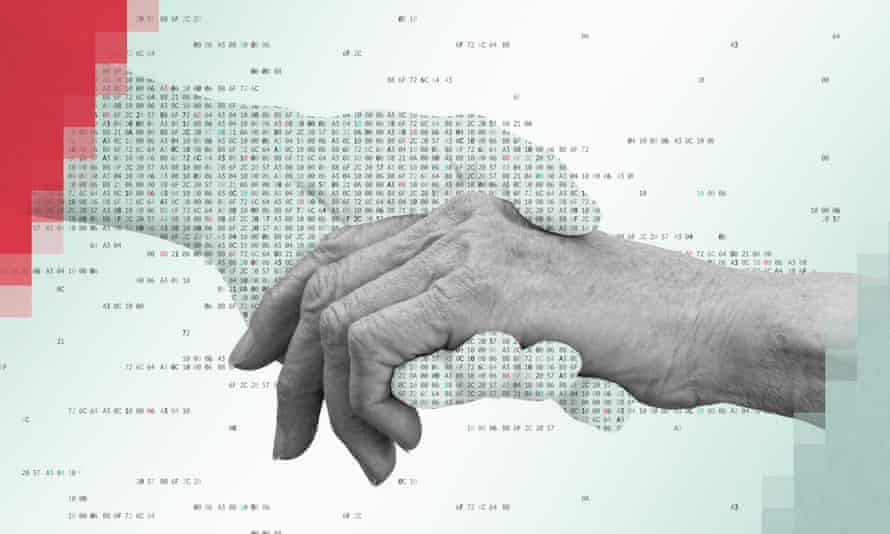A new series from Guardian US aims to scrutinize this monumental shift in the way society cares for those in need.
The Guardian
Virginia Eubanks and Alexandra Mateescu
Thu 3 Jun 2021
America is facing a caring crisis, with too few care workers able to take the difficult underpaid jobs that help the nation’s elderly and those with disabilities live with dignity.
Who – or what – will step into the breach?
Increasingly the answer seems to be devices and automated systems powered by artificial intelligence (AI).
- In nursing facilities, sensors monitor the movements of patients and alert human staff if they fall over or take a concerning number of bathroom breaks.
- In private homes, cameras watch elderly residents and ping their children if they wander somewhere unsafe.
- Artificial companions keep the lonely company.
- Cellphone apps track home healthcare workers’ physical location and count every minute they dedicate to their clients.
- Psychiatrists say their field is ripe for AI-based therapy.
The new Guardian US series Automating Care will scrutinize this monumental shift in the way society cares for those in need – and will consider the risks as well as the benefits.
Artificial Intelligence (AI)
Artificial intelligence (AI) refers to computer systems that do things that normally require human intelligence.
While the holy grail of AI is a computer system that is indistinguishable from a human mind, there are several forms of specialized AI that have already been rolled out in the caring industry.
The companies and government agencies creating these systems, and some care providers, say that they can help
- keep patients safe,
- free human caregivers from routine tasks,
- allow seniors to continue living in their own homes for longer, and
- cut down on fraud, waste and abuse.
Critics raise red flags around bias, surveillance and the erosion of autonomy in digital care systems.
- Assumptions about how the elderly and disabled should behave can be invisibly baked into the code. Systems that prioritize safety from falls over freedom of movement implicitly marginalize the elderly’s desire for privacy and self-determination in favor of assuaging their adult children’s fears.
- An electronic timesheet that only allows caregivers to clock in or out from inside a client’s house assumes the disabled are homebound, not living active and independent lives.
- Systems that track a worker’s every movement and minute betray a deep cultural anxiety about the value of care and those who perform it, especially the Black and immigrant women who make up the majority of the care workforce.
The AI industry as a whole is also reckoning with other areas of bias.
- AI systems are trained on huge troves of historical digital data, but as many widely publicized cases show, these datasets often reflect past racial disparities in how patients are treated, which AI systems learn from and replicate.
- Researchers have found that those being monitored by AI systems can also experience them as intrusive, fear that the new tools will limit their independence, and may prefer human contact to a persistent digital gaze.
Artificial Care is guest-edited by
Virginia Eubanks, the political scientist and author of Automating Inequality: How High-Tech Tools Profile, Police, and Punish the Poor, and by
Alexandra Mateescu, a researcher at the Labor Futures initiative at Data & Society and co-author of AI In Context: The Labor of Integrating New Technologies.
It is based on research commissioned by the Guardian from the Social Science Research Council’s Just Tech program.
Originally published at https://www.theguardian.com
https://www.theguardian.com/us-news/2021/jun/03/automating-care-about-new-series-guardian-us
Credits of the image:
‘Systems that track a worker’s every movement and minute betray a deep cultural anxiety about the value of care and those who perform it.’ Illustration: Erre Gálvez/The Guardian












